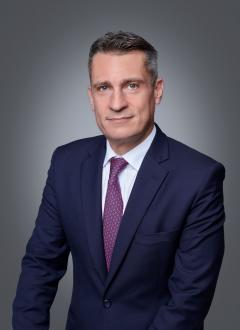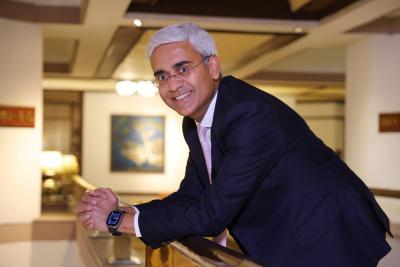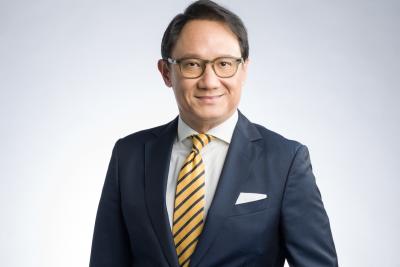Lombard Odier’s CEO on Decoding the Evolving Needs of Asia’s Ultra Wealthy

Vincent Magnenat of Lombard Odier
Apr 13, 2021
Vincent Magnenat is a private banking leader in Asia with a robust strategy for expanding the bank’s presence onshore and offshore across the region. In his role as Limited Partner and CEO for Asia at Swiss private bank Lombard Odier, a 225-year old, family business that has been privately-owned for seven generations, Magnenat has been building the bank’s presence in the region by remaining focused on its core strengths in holistic investment solutions and family services advisory since entering Asia over 30 years ago. The growth of Lombard Odier’s business in Asia has been driven by increased awareness of its value proposition. He met again recently with Hubbis to talk about a White Paper the bank had published on private banking for Asia’s UHNWIs in the ‘new world’ wrought out of the global Covid-19 crisis. The extensive report was based on in-depth discussions with over 150 ultra-wealthy individuals and families across the region, and offered a remarkable opportunity for the bank to discuss key issues and themes that are close to their hearts. He also reported how, despite the challenges of the pandemic, the bank is producing some outstanding results, helped by its proactive approach to anticipating future client expectations and emerging wealth and investment market trends in the region and further afield. He remains optimistic for the future, as Asia’s wealthy private clients adopt an increasingly sustainable and multi-generational outlook, while also warming increasingly to the bank’s discretionary and active advisory models.
Magnenat opens the discussion by explaining that Lombard Odier and five of its strategic alliances in the region had, during 2020, engaged in conversations and interviews with more than 150 of Asia’s leading UHNW families and entrepreneurs, domiciled in Singapore, Hong Kong, Japan, Thailand, Philippines, Indonesia, and Taiwan.
The results of this process were then distilled into what is an insightful White Paper
Magnenat elaborates on the findings of the White Paper, noting that the core aim was to understand how these individuals perceive their environment in the context of the Covid-19 pandemic, the impact the crisis has had on their lives, families and businesses and what they think the post-pandemic future will look like.
“As a result, equipped with concrete feedback, Lombard Odier will thus be better placed to understand the needs and expectations not only during this pandemic but also post-pandemic,” he reports. “And we will be better able to analyse if these needs are being met and the current service offerings in the market are living up to UHNWIs’ expectations. As a seventh-generation family-owned bank, we believe we are ideally suited to help these clients through the years ahead, partnering with these leading families and entrepreneurs for the future, and across the generations.”
The four key areas highlighted from the research into the White Paper are – the accelerated rise of digital and how technology has redefined banking relationships; the delicate balance between returns versus risks and increasing need for advice; the growing conviction towards sustainability and the acknowledgment that it’s not merely a fad; as well as the importance of family services such as wealth and estate structuring and family legacy planning.
“These combine to a comprehensive vision for us all to digest, and insights that will be actionable in this coming new era,” he comments. “Listening to the expectations of these UHNWIs – some half of whom are actually not Lombard Odier clients - has given us an invaluable insight into the passions that will drive their decisions going forward and their priorities in the ‘new reality’.”
Alignment of outlook
The White Paper fits ideally into the type of client base and approach that the bank takes in Europe and across Asia Pacific. Lombard Odier today has two value propositions in the region: the high-net-worth and UHNW family services practice and investment services. In both of these areas, the bank has in recent years under Magnenat’s stewardship been expanding its presence across the region, both through its own offices in Singapore, Hong Kong and Tokyo, as well as through its growing array of high-quality onshore strategic alliances, which now include markets such as Thailand, the Philippines, Indonesia, Taiwan and Australia.
The bank remains focused on its core value proposition, which is founded on four key pillars. The first is the managing of global wealth across its three private banking office operations in Singapore, Hong Kong and Japan. The second is an expansion of the onshore private banking proposition through its regional strategic alliances. The third pillar is external asset management. And the fourth pillar is building on its family offices and related wealth planning services.
Onshore & offshore
The bank has been a pioneer of strategic alliances to achieve its expansion in the region. Today, there are six strategic alliances – Kasikornbank in Thailand, UnionBank of the Philippines, Bank Mandiri in Indonesia, Taipei Fubon Bank, Mizuho Securities (Singapore) and JBWere in Australia.
“We have leveraged the excellent relationships these strategic alliances have with their UHNW clients to gain deep insights into how their needs and expectations have evolved since the pandemic struck, and therefore, how we should position for the years ahead,” Magnenat explains. “Through these strategic alliances, we have demonstrated that we are committed to a two-way flow of knowledge to help us better understand the onshore environment.”
Accordingly, rather than being reactive, the bank continues to strive to be proactive, leading the private wealth industry towards the new environment in which we all find ourselves. “Notably,” he comments, “the relationships we have amongst our strategic alliances create an ecosystem – one that not only can we all leverage, but one that our clients can also tap into, and therefore we are able to deliver a more complete and robust private banking proposition for the future.”
Enjoying the process
“The results came after what was a remarkable process,” Magnenat elucidates. “We first conducted the quantitative aspect of the study through an online survey with these clients, and then followed up with qualitative discussions. While each discussion was slated for 40 minutes, it was incredibly heart-warming that some went on for as long as five hours. In fact, for some of these discussions that we had, these clients were bringing in different family members across different generations. They clearly felt a great need to share their views. To be hearing these insights and quite often, highly personal perspectives on a video call into their own homes – often their own living rooms – was really positive and engaging, offering deep discussions, and all at a time when normally they might be racing across the country, region or globe in meetings and for all sorts of reasons.”
Key concerns
The White Paper noted that the Covid-19 crisis has accelerated the digitalisation of our economies and societies. It also pointed to the likely legacy of Covid-19 as an environment of greater inequalities, commenting that technology might not necessarily help to fill the gap in the near term, but that it might emerge as a potential white knight in the long-run, with infrastructure upgrades leading to wider access to education.
On the topic of Climate change, some 55% of the UHNWIs interviewed said they are expecting an acceleration of measures to combat climate change, and that their main concern seems to be whether there will be a coordinated effort between countries in their effort to fight climate change. Connected to this, an overwhelming 89% of respondents said that the sustainability trend is here to stay, with this being a key theme for the next generations of UHNWIs.
Sustainability in sharp focus
“As to sustainability, the third key trend identified, Magnenat expressed that there were initial concerns that the momentum built up in 2018 and 2019 especially around sustainability, climate change and ESG might wither in the face of the virus and its impacts, but that in the reality, it was completely different.
“The reality is that it remains a huge upward trend,” he reports.
“This revolution will be the biggest source of returns and risks in the coming years; investing the right way in terms of sustainability and climate transition will be essential in the coming years. The distinct feedback from the many discussions with these clients, and others, is that Asia is really becoming much more engaged in these matters. In fact, interest in sustainability themes and behaviours is extremely high, especially amongst the next generation family members.”
Expert advice required
The need for enhanced advice in the face of great global change and uncertainty came through, loud and clear. Those involved in the survey seem to think that low interest rates will persist for the foreseeable future, with 78% stating that low rates will last long into the future. Aside from challenging traditional asset allocation norms, the UHNWIs canvassed are concerned about bubbles potentially emerging and expect enhanced risk management measures from their banks.
“As a result,” Magnenat elucidates, “they need more advice, and more guidance, especially those who are seeking the next wave of attractive investment opportunities rather than just opting for safety. However, in a more complex world, it is harder to understand underlying risks, leading to the need for greater and higher quality advice.”
The study points to concerns amongst UHNWIs that globalisation has hit reverse gear, and they anticipate a more local and less global world ahead. Thus, they accordingly have a greater need for a trusted local adviser to help them navigate and access markets, as they can no longer travel easily. Moreover, with a more local or regional focus, 76% of UHNWIs surveyed said they value the ability of private banks to facilitate access to local entrepreneurs/opportunities and to financing solutions.
Remote but not distant
As to engagement, UHNWIs believe that the future will be a marriage of both face-to-face as well as digital and remote interactions. There is also an expectation that their bankers continue treating them highly personably in the manner in which they deliver information, insights, advice and how they communicate, albeit digitally.
“I personally feel that this revolution in communication will endure well beyond the pandemic, as a means of optimising our interactions,” Magnenat comments.
“For us at the bank, technology is far more than a simple catalyst in the evolution of new ways of communicating, it is a key pillar of our business model, and we have built a tech platform and digital user experience that is perhaps one of the best in the industry. In an increasingly competitive market, the winners will be those who can identify the optimal balance between traditional approaches and secure cutting-edge technology to give clients what they demand. We have been on the technological journey for over 25 years now, it is part of our strategic approach.”
Structuring and planning
And finally, under the cross strap of family services, the White Paper highlights how some of these ultra-wealthy families have seen the pandemic as a catalyst for bringing some overseas family members home, while others saw it as an opportunity to maintain local access in foreign countries. Some of these families have seized this hiatus as a time for improving wealth and estate structures and planning for the future.
“There has clearly been a huge impact on the way families of all levels have reacted to this crisis,” he comments. “For UHNW families with wealth, assets, lifestyle, business and relationships across the globe, this has caused a fundamental reassessment of the future for many of them.”
Stability personified
Moving from the report to the relevance of the bank itself, Magnenat explains that for the UHNW segment, the appeals of Lombard Odier are plentiful and compelling. Not only is it a seventh-generation family-controlled bank, but with a rating of AA- and CET1 ratio of close to 30, the bank, he says, is immensely stable.
“More than 50% of the net new money that we won in what was an impressive year in 2020 came from existing clients and 50% from new clients,” he reports. “This is a wonderful testimony to the trust clients put in us in times of crisis like this. But it is not only about our financial stability, it is our approach to investments and the quality of our advice that is drawing significant new money to the bank.”
He comments that the bank’s DPM and especially risk-based approach has a very strong logic and robust track record, helping compound returns over the longer-term. “Taking high conviction investments into considerations in the core/satellite portfolio approach we promote helps significantly. The active advisory and high conviction investments triggered a lot of interest, not only from our existing clients but from new clients.”
Seeing the big picture
But he adds that Lombard Odier’s proposition does not stop there. “We are holistic in our vision of the clients and their families, accompanying the clients with advice and support in terms of family governance, business governance, structuring for the future, and across the younger generations. And more importantly, as I explained, we offer both a deep global perspective, and also deep onshore proposition in conjunction with our strategic alliances. This is not only about risks and returns in the AUM we work on for them, but about how these individuals and families structure their wealth, how they will pass them on to the next generations, how they create or maintain good governance, and how they can also build a more philanthropic and sustainable approach.”
He adds that while Lombard Odier is not a universal bank, the strategic alliances have helped the bank leverage a dramatically larger onshore presence than the bank could have achieved without enormous investment. “The strategic alliances have developed really well, we continue to focus intently on those, and we also know that our partners and clients are aligned in the pursuit of sustainability in the years ahead.”
He also comments that the pandemic-enforced lack of travel worked well for the bank in terms of its strategic alliances, which on the ground locally could offer clients the onshore support but combined with the global reach of Lombard Odier. “This new and difficult environment has served to reinforce our approach and these relationships. Managing these relationships through a time of crisis brings you even closer, even faster.”
Key Priorities
Magnenat’s first priority is to continue to manage the growth and retain the bank’s focus and discipline. “We need to continue to build a very scalable business in the region, to build further on the strategic alliances. Another priority is hiring the right talent, to further scale our business in the region, and we recognise the need to provide these high quality bankers with the platform through which they can be extremely successful, even during these times of remote engagement, but also looking ahead to some resumption of normality.”
Silver linings
Magnenat closes the discussion by commenting that the past year has been one of the ‘worst’ in his life, for all the obvious human reasons. “But,” he says, “it has also been a time for deep personal reflection on what and who are really valuable to me and my family, to reinforce our priorities and our values. And from a business perspective it has been a time of reinforcing the value and depth of our team approach, and of our strong and growing relationships with our partners and clients around this dynamic region.”
Getting Personal with Vincent Magnenat
Lombard Odier's Asia CEO, Vincent Magnenat, has been heading the private bank's operation in Asia since 2013. “I have been in Asia for over 20 years now, so much so that I feel that my outlook and perspectives are an amalgamation of both Swiss and Asian values.”
He hails from Brienne in Switzerland and grew up near Lausanne. Early in his career, he took an apprenticeship with Winterthur Insurance, which in 1998 was bought by Credit Suisse. "I began with Credit Suisse with the wind in my sails," he recalls, "as they were very eager to expand into insurance. My career with them brought me to Singapore, which was an exciting and challenging step."
Some years later Magnenat was appointed a managing director at Societe Generale and in 2013 was headhunted into Lombard Odier as its Asia head of private banking. He was subsequently promoted to CEO of Asia and became a limited partner of the firm.
“As a bank with over 220 years of experience, we have the memory of the experience, and we apply this to the advice and support we give to leading families and entrepreneurs in the region. Our background is Swiss-rooted, but we take a resolutely international, and digitally-augmented approach to serving our clients. We are committed to this business and building upon the bank's success in the region."
He says that not only is Lombard Odier a wonderful bank to work with, given the philosophy, longevity and global strategy, but it is also a remarkable opportunity to meet a lot of successful and interesting people.

Limited Partner, Global Head of Strategic Alliances, Asia Regional Head at Lombard Odier
More from Vincent Magnenat, Lombard Odier
Latest Articles






